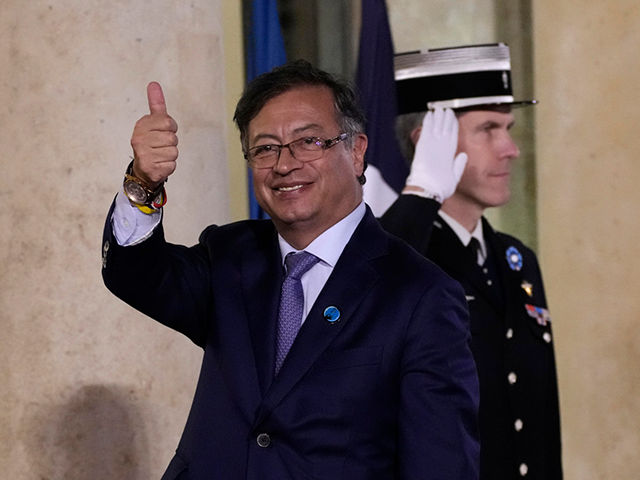The latest batch of the “Twitter files” document dump released by Matt Taibbi on Tuesday revealed that throngs of Russian-operated bot accounts on Twitter supported far-left Colombian President Gustavo Petro’s campaign last year.
The bots allegedly promoted campaign hashtags and mentions to improve the visibility of the then-candidate’s messaging.
32.“USIC" requests often simply began “We assess” and then provided lists (sometimes, in separate excel docs) they believed were connected to Russia’s Internet Research Agency and committing cyber ops, from Africa to South America to the U.S.: pic.twitter.com/wpdr7Cxa1n
— Matt Taibbi (@mtaibbi) January 3, 2023
According to the documents, shared through current Twitter owner and pro-China green technology celebrity Elon Musk, Twitter officials detected unusual behavior on three hashtags related to Petro: #PactoHistorico, #PetroPresidente2022, and #PetroPresidenteColombia2022. The left-wing parties that belonged to Petro’s Pacto Histórico por Colombia (“Historic Pact for Colombia”) used these hashtags to publicize the campaign.
The unusual bot behavior was reportedly detected on Twitter in 2021 during a routine monitoring of social media activity by the United States Intelligence Community (USIC), with a special focus on Venezuela, Cuba and Colombia, concluding that the listed bot accounts were connected to a pro-Petro influence network.
Gustavo Petro, a former member of the Marxist terrorist M19 guerrilla, was elected president in June, becoming Colombia’s first-ever leftist president.
During the presentation of the letters of credence of Héctor Arenas Neira, Colombia’s new ambassador to Russia in September, Russian leader Vladimir Putin stated that he wished o maintain “friendly relations” with Colombia, describing the South American nation as a “promising partner” of Russia in Latin America. Russia maintains deep ties with the neighboring socialist regime of Venezuela and its dictator Nicolás Maduro.
Ricardo Roa, who served as Petro’s presidential campaign manager, denied having arranged the support of other countries for Petro’s campaign on social media through a radio interview hosted by Colombia’s W Radio on Wednesday. Roa said that Petro’s presidential campaign had not officially launched during the dates cited in the Twitter files dump.
“We never arranged links, support or any negotiation with virtual platforms sponsored by the Russian government or from any country other than ours,” Roa said during his interview. “With the resources obtained in the financial sector, we paid advertising within the legally established conditions and requirements.”
Former Colombian presidential candidates and politicians have expressed outrage following the Twitter files dump and demanded an explanation from Petro for the alleged Russian involvement in promoting his campaign. Federico Gutiérrez, the conservative establishment candidate for the right-wing Equipo por Colombia (“Team for Colombia”) coalition during the 2022 presidential elections, accused Petro of cheating and lying to win the race.
Ganaron con trampas, mentiras, apoyo de estructuras criminales y hasta con injerencia de Rusia.
Con razón Petro no cuestionaba en campaña la invasión y las muertes en Ucrania.
Se preparan para hacer lo mismo en las elecciones regionales de este 2023? https://t.co/r0uGCPACIk— Fico Gutiérrez (@FicoGutierrez) January 4, 2023
“They won with cheating, lies, support from criminal structures and even with interference from Russia,” Gutiérrez wrote. “No wonder Petro did not question the invasion and the deaths in Ukraine during the campaign. Are they preparing to do the same in the 2023 regional elections?”
Enrique Gómez Martínez, former 2022 presidential candidate of the “Salvación Nacional” (National Salvation) coalition, called the extent of the Russian influence in the campaign “incredible.”
Cuentas rusas respaldaron y seguramente respaldan todo lo relacionado con Petro y en Pacto Histórico. Es increíble el alcance, el daño que vienen haciendo a las democracias en el continente este tipo de estrategias. https://t.co/Q71DO0vyol
— Enrique Gómez (@Enrique_GomezM) January 4, 2023
“Russian accounts supported and surely support everything related to Petro and the Historical Pact,” Gómez wrote, “The scope is incredible, the damage that these types of strategies have been doing to democracies on the continent.”
María Fernanda Cabal, a conservative senator from Colombia’s Democratic Center party, recalled prior accusations that Petro was using content farming to advance his agenda online.
La campaña de Petro, donde “corrían la línea ética”, recibió apoyo desde Rusia con cuentas falsas, hashtags organizados y menciones para posicionar al candidato de extrema izquierda.
¿Que las bodegas petristas no existían?
— María Fernanda Cabal (@MariaFdaCabal) January 4, 2023
“Petro’s campaign, where they ‘walked the ethical line,’ received support from Russia with fake accounts, organized hashtags, and mentions to position the far-left candidate. Didn’t the pro-Petro bodegas not exist?”
Colombians use the term “bodega” (warehouse) to refer to teams, or in some cases a single individual, that promotes viral content — mostly of a political or social nature — on social media on a massive scale. The term comes from the fact that when they originally began to operate in Colombia in 2010, they did so in actual physical warehouses, where a group of people would go and work together to artificially viralize content.
Jonathan Pulido Hernández, Colombian YouTube content creator and senator for the Green Alliance party — which supports Petro’s government — applauded Musk for the exposure.
🔴INCREÍBLE!! El propio @elonmusk propietario de Twitter, validó y mostró al mundo como desde Rusia utilizaron BOTS a favor de la campaña de Gustavo Petro! Con usuarios falsos, Hashtags Programados y miles y miles de menciones posicionaban la campaña en Twitter! #CeroLíneaÉtica https://t.co/Oz3MTIwOlF pic.twitter.com/Ah4qzQ73Gs
— Jota Pe Hernández (@JotaPeHernandez) January 4, 2023
“Incredible! Elon Musk, the owner of Twitter himself, validated and showed the world how they used bots from Russia in favor of Gustavo Petro’s campaign! they positioned the campaign on Twitter with fake users, scheduled hashtags and thousands and thousands of mentions!” Pulido Hernández wrote.
Christian K. Caruzo is a Venezuelan writer and documents life under socialism. You can follow him on Twitter here.

COMMENTS
Please let us know if you're having issues with commenting.